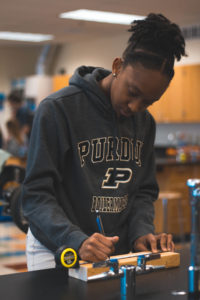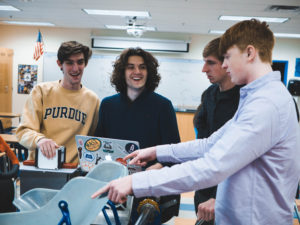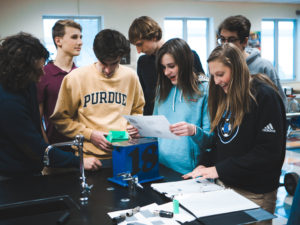Educational Perspective
It is well known that education is most effective via active learning, hands-on projects, providing a real world context and making learning fun. Knowing what should be done is not the key challenge, instead it is implementing these effective educational methods at-scale, in a sustainable cost-effective way that meets the constraints inherent in the public school system. Hardware Store Science addresses these educational implementation challenges.
- Science is NOT about the memorization of scientific principles.
- Science is a process called the scientific method for rationally determining the underlying cause of an observation in the physical world.
Active Learning
 Most students learn best when they are actively engaged in the education process instead of being passive participants. Most science classes, however, are taught passively. Students sit in their seats, politely raise their hands, memorize abstract concepts, fill out worksheets and then are examined via multiple choice tests. Most students are overwhelming bored by this passive approach to education.
Most students learn best when they are actively engaged in the education process instead of being passive participants. Most science classes, however, are taught passively. Students sit in their seats, politely raise their hands, memorize abstract concepts, fill out worksheets and then are examined via multiple choice tests. Most students are overwhelming bored by this passive approach to education.
Physical Science often seems more like a history lesson than anything that is relevant.
This is particularly true in many traditional physical science classes, where students learn by rote (and then quickly forget) abstract scientific principles discovered 100 or more years ago that are disconnected from any current interests that students care about. While this traditional approach might work for a small fraction of students, the majority just become frustrated and/or bored with science. If our goal is to engage students with the STEM disciplines, we need to radically change the educational delivery mechanism so students become active participants in their education. The central idea of Hardware Store Science is active learning, where student teams build their own experimental test apparatus and then discover basic science principals using their apparatus.
Hands-on Projects
Hands-on experiments are a proven way to better engage students. The key challenge is to have a sufficient number of interesting and fun physical science experiments in a traditional physical science classroom so that small teams of students can discover key scientific principles – and in the process discovery the excitement of science. Hardware Store Science experiments address this challenge by having student teams build their own experimental apparatus from materials that are available in any hardware store. The experiments are economical, so there can be multiple small student teams in a single classroom, with each student team actively participating in the discovery process. The suite of Hardware Store Science experiments covers all of the physics and chemistry topics in a typical physical science course. There is no change in the content, just in the delivery mechanism.
Learning in Context
 A proven way to actively engage students in the learning process is to provide real world context, preferably in a context that interests the students. Hardware Store Science is connected to the evGrandPrix program, where student teams design, build and test an electric go kart that they then race at the Indianapolis Motor Speedway as part of the Indy500 festivities each May. Most of the physical science concepts discovered in the suite of Hardware Store Science experiments are integral to the technology in the electric go karts. The electric go karts have a Physics Box that measures quantities like energy usage, power, velocity, acceleration, and more concepts that have been discovered in the Hardware Store Science. Scoring for the evGrandPrix has an Engineering Design component, where the students show through data how the science concepts learned in the classroom are connected to their vehicle performance. The evGrandPrix is not a required in order to implement Hardware Store Science, but it does provide a real world example of how the various science concepts come together in an engineering device that excites young people.
A proven way to actively engage students in the learning process is to provide real world context, preferably in a context that interests the students. Hardware Store Science is connected to the evGrandPrix program, where student teams design, build and test an electric go kart that they then race at the Indianapolis Motor Speedway as part of the Indy500 festivities each May. Most of the physical science concepts discovered in the suite of Hardware Store Science experiments are integral to the technology in the electric go karts. The electric go karts have a Physics Box that measures quantities like energy usage, power, velocity, acceleration, and more concepts that have been discovered in the Hardware Store Science. Scoring for the evGrandPrix has an Engineering Design component, where the students show through data how the science concepts learned in the classroom are connected to their vehicle performance. The evGrandPrix is not a required in order to implement Hardware Store Science, but it does provide a real world example of how the various science concepts come together in an engineering device that excites young people.
Inquiry Based Learning
Traditional education is based on transfer of knowledge from the teacher to the student through a lecture or reading a textbook. Although this might be an efficient way to cover a lot of material (at least from the teacher’s perspective), the ‘sage-on-the-stage’ approach is not an effective way for most students to learn. Students learn better and retain the information longer if they are given a question and then helped to discover the answer to that question. Hardware Store Science uses this inquiry-based learning approach. After the student teams build their apparatus they are taught how to do one simple experiment and analyze that data. Then, the teams are asked several “what if” questions that they address by designing an experiment using their experimental apparatus. In the classroom, different teams may be addressing different questions, where they then describe their findings to rest of the class. The teacher becomes a coach for the student teams, helping them discover their own answers. Most important, true science is this process of rational discovery of how the physical world works – a process that can only be learned by doing, not by the memorization of scientific principles (for additional discussion go to The Real Purpose of Science).
Learning Needs To Be Fun
All too often, students in a physical science class describe the class as boring – perhaps not the small percentage of students that are already committed to a science or engineering career, but the majority of the students believe the material is something to be endured, not embraced. Even a professional scientist or engineer would find the memorization of facts discovered long ago to be boring. As an example, consider memorization of the conservation of energy principle where sum of kinetic and potential energy is a constant – an abstract principle that students memorize for the test and have forgotten by next year (or more likely next month). Instead, consider a ball launching experiment (see Module 7: Ball Launcher) where student teams develop their own ball launcher, record the flight of the plastic ball with their cell phone, and then analyze the data to discover the conversion of kinetic energy to potential energy. Which is more fun: memorization of the conservation of energy principle or launching balls across the class room to discover the relationship between kinetic and potential energy? And then, students build their own go karts, relate the classroom science principles to the operation of the go kart and then race their go karts as part of the Indy500 where everyone celebrates their academic success. The physical sciences are anything but boring, where Hardware Store Science is designed to allow students to have fun while they are discovering the underlying principles of how our world works.
All students
 Science has increasingly become the domain of the professional scientist or engineer, where the words of science are often incomprehensible to the majority of society. This lack of science appreciation is a serious problem in a world where technology is increasingly important. There is a significant need to engage all students with the importance and excitement of the physical sciences, not just those who are already heading towards a career in science or engineering. Because Hardware Store Science uses a contextualized, hands-on, inquiry-based approach that aligns with the learning style of most students (not just the academically gifted), it provides an effective science education for all students. In addressing the inquiry questions, students develop basic problem solving skills that are important in a wide variety of both technical and non-technical careers (see The Real Purpose of Science Education for additional discussion). However, just because Hardware Store Science is for all students, it is most certainly not ‘dumbed-down’ science. The course covers all of the important physical science principles. Because students see each science principle in action with their own hands, they emerge from a physical science class that employs Hardware Store Science experiments with an intuitive understanding of the various physical processes in addition to the definitions and formulas. For a student pursuing a science or engineering career, this intuitive understanding is at least as important, if not more, as the more formal definitions, principles and formulas typically taught in a science class.
Science has increasingly become the domain of the professional scientist or engineer, where the words of science are often incomprehensible to the majority of society. This lack of science appreciation is a serious problem in a world where technology is increasingly important. There is a significant need to engage all students with the importance and excitement of the physical sciences, not just those who are already heading towards a career in science or engineering. Because Hardware Store Science uses a contextualized, hands-on, inquiry-based approach that aligns with the learning style of most students (not just the academically gifted), it provides an effective science education for all students. In addressing the inquiry questions, students develop basic problem solving skills that are important in a wide variety of both technical and non-technical careers (see The Real Purpose of Science Education for additional discussion). However, just because Hardware Store Science is for all students, it is most certainly not ‘dumbed-down’ science. The course covers all of the important physical science principles. Because students see each science principle in action with their own hands, they emerge from a physical science class that employs Hardware Store Science experiments with an intuitive understanding of the various physical processes in addition to the definitions and formulas. For a student pursuing a science or engineering career, this intuitive understanding is at least as important, if not more, as the more formal definitions, principles and formulas typically taught in a science class.

